Ever wondered which are the best for tracking research impact and citations? Uncover the top 25 tools for research impact in our latest blog post!
As scholars strive for excellence, understanding your research’s reach is paramount. Today, we reveal the best tools for tracking research impact and citations that will empower you to measure and amplify your work’s influence.
Join us in navigating the dynamic landscape of academia as we uncover invaluable resources designed to elevate your research’s visibility and make a lasting impression in the scientific community.
Table of Contents
Overview
Research impact and citations are essential indicators of the quality and reach of a scholarly work. They are measured using different research metrics, such as citation counts, h-index, and alternative metrics (altmetrics).
These tools not only provide insights into the influence of a particular publication but also help research teams identify potential collaborators, funding opportunities, and areas for improvement. In this article, we will explore the top tools for tracking research impact and citations.
Best Tools for Tracking Research Impact and Citations
#1. Google Scholar: Best for searching scholarly literature and tracking citations across various disciplines

Summary
- Comprehensive search engine for scholarly literature
- Tracks citations across multiple disciplines
- Free to use
Google Scholar is a widely-used search engine that offers extensive coverage across various disciplines, making it user-friendly and easily accessible. This tool serves as an exceptional starting point for researchers who want to monitor citations and evaluate the impact of their work across numerous fields.
With regular updates to citations and metrics, Google Scholar enables users to stay updated on the influence of their research and the citations it garners.
What are the benefits of Google Scholar?
- Comprehensive Search: Google Scholar offers a wide range of scholarly literature, including articles, theses, books, conference papers, and patents.
- Citation Tracking: This tool allows users to track citations of their work and view citation metrics.
- Personalized Recommendations: Google Scholar provides personalized recommendations based on users’ research interests.
Google Scholar is an excellent starting point for researchers looking to track citations and measure the impact of their work across a wide range of disciplines.
Source: https://scholar.google.com/intl/en/scholar/metrics.html
#2. Scopus: Best for tracking citations and abstracts in scientific, technical, medical, and social sciences
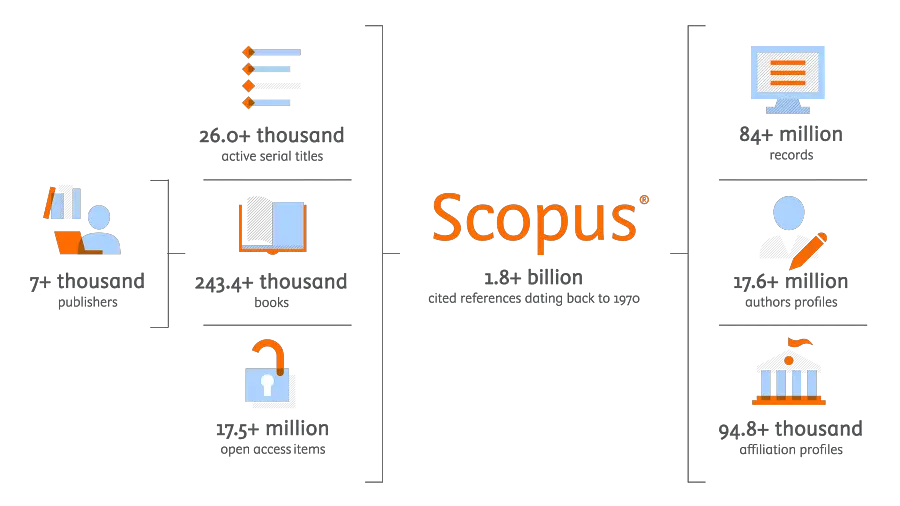
Summary
- Largest abstract and citation database
- Covers scientific, technical, medical, and social sciences
- Offers advanced analytics and visualization tools
Scopus is a comprehensive database that provides citation tracking and abstracts for research articles in scientific, technical, medical, and social sciences.
This tool offers advanced analytics and visualization tools for better understanding research impact, making it a powerful tool for researchers working in these fields.
What are the benefits of Scopus?
- Extensive Coverage: Scopus covers a large number of peer-reviewed journals, conference proceedings, and trade publications.
- Citation Analysis: You can use it to track citations and as a journal analyzer.
- Author Profiles: Scopus provides author profiles, including publication history, citation metrics, and affiliations.
Scopus is a powerful tool for researchers working in scientific, technical, medical, and social sciences, offering extensive coverage and advanced analytics to track research citation impact.
Source: https://www.elsevier.com/solutions/scopus/how-scopus-works/metrics
#3. Web of Science: Best for multidisciplinary research citation tracking and analysis

Summary
- Multidisciplinary citation database
- Offers citation analysis and research evaluation tools
- Covers a wide range of subject areas
Web of Science is a citation database covering multiple disciplines. This database offers tools for citation analysis and research evaluation.
Web of Science also provides a platform for tracking research impact, identifying influential publications, and monitoring citations across various fields.
What are the benefits of Web of Science?
- In-Depth Citation Tracking: Web of Science offers comprehensive citation tracking across multiple disciplines.
- Analytical Tools: This platform provides various tools for analyzing research impact, including citation reports and h-index calculations.
- Curated Content: Web of Science includes only high-quality, peer-reviewed publications
Web of Science is a valuable resource for researchers looking to track citations and analyze the impact of their work across multiple disciplines.
Source: https://guides.lib.umich.edu/citation/WebofScience
#4. PubMed: Best for searching biomedical and life sciences literature and citations
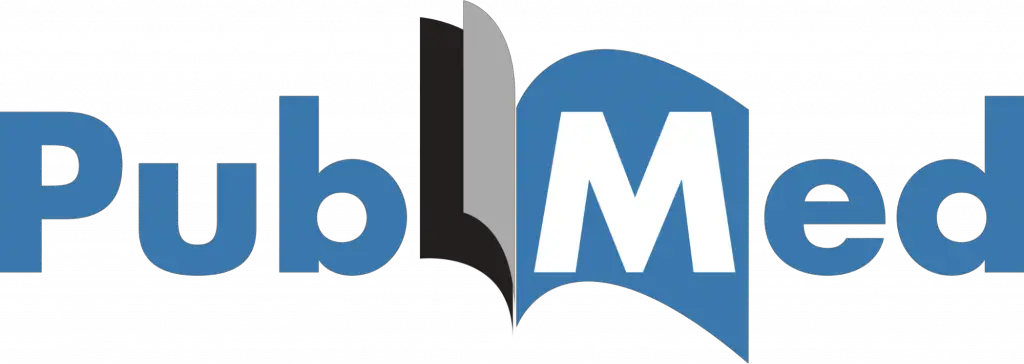
Summary
- Database of biomedical and life sciences literature
- Offers citation tracking and advanced search features
- Free to use
PubMed is a free database that specializes in biomedical and life sciences literature, offering citation tracking and advanced search features for researchers in these fields.
This tool is maintained by the National Library of Medicine (NLM) and is essential for tracking the impact of research and citations in these disciplines.
What are the benefits of PubMed?
- Specialized Database: PubMed focuses on biomedical and life sciences literature, making it a valuable resource for researchers in these fields.
- Advanced Search Options: Users can apply filters and use terms to refine their search results.
- Free Access: PubMed is freely accessible, allowing researchers to search and access full-text articles without a subscription.
PubMed is an essential tool for researchers in the biomedical and life sciences fields, offering comprehensive coverage and citation tracking features.
Source: https://pubmed.ncbi.nlm.nih.gov/26806079/
#5. Dimensions: Best for tracking citations, grants, and patents in a single platform

Summary
- Integrates citations, grants, and patents data
- Offers analytics and visualization tools
- Free and subscription-based versions available
Dimensions is a powerful platform designed to offer a comprehensive view of research impact by integrating citations, grants, and patents data. This innovative tool is perfect for researchers who want to track the impact of their research and citations while also exploring grant and patent data.
With analytics and visualization tools, Dimensions provides valuable insights into the broader context of research work.
What are the benefits of Dimensions?
- Unified Platform: Dimensions combines citation data, grants, and patents, providing a comprehensive view of research impact.
- Analytical Tools: Users can analyze citation data, funding trends, and research collaborations.
- Open Access: Dimensions offers free access to citation data and limited access to grants and patents data.
Dimensions is an innovative platform for researchers looking to track citations and research impact while also exploring grant and patent data.
Source: https://www.dimensions.ai/resources/evaluate-the-reach-and-impact-of-your-universitys-researchers/
#6. Altmetric: Best for tracking online attention and mentions of research out
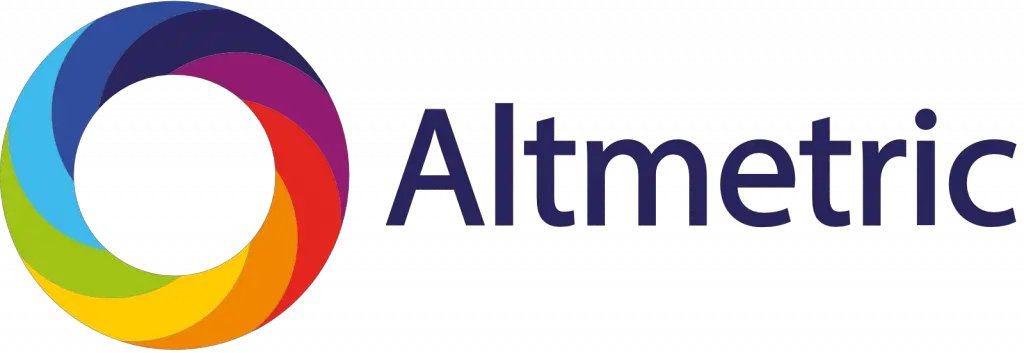
Summary
- Tracks online attention and mentions of research outputs
- Covers social media, news, blogs, and more
- Offers Altmetric Attention Score and badges
Altmetric is a tool that tracks online attention and mentions of research outputs, covering sources such as social media, news, and blogs. It provides an Altmetric Attention Score and badges to help researchers understand the broader impact of their work, including its impact on research and citations.
What are the benefits of Altmetric?
- Real-Time Tracking: Altmetric tracks online attention to research outputs in real-time, including social media, news outlets, and blogs.
- Altmetric Score: This tool provides an Altmetric Score, which indicates the level of online attention a research output has received.
- Visualizations: Users can view detailed visualizations of online attention and mentions.
Altmetric is a valuable tool for researchers looking to understand the online attention and engagement their work receives, providing insights beyond traditional citation metrics.
Source: https://www.altmetric.com/
#7. Plum Analytics: Best for tracking research impact using alternative metrics

Summary
- Tracks research impact using alternative metrics
- Covers usage, captures, mentions, social media, and citations
- Offers PlumX Metrics
Plum Analytics is a comprehensive tool designed to help researchers track the impact of their work using alternative metrics. By considering aspects such as usage, captures, mentions, social media, and citations, Plum Analytics offers a more complete picture of the reach and influence of a researcher’s work.
PlumX Metrics, a feature of Plum Analytics, provides easy visualization of these metrics, making it user-friendly and accessible.
What are the benefits of Plum Analytics?
- Comprehensive Metrics: Plum Analytics tracks a wide range of metrics, including usage, captures, mentions, social media, and citations.
- Research Output Types: This tool covers various research output types, such as articles, books, conference proceedings, and datasets.
- Customizable Dashboards: Users can create custom dashboards to monitor and analyze research impact.
Plum Analytics is an excellent tool for researchers looking to explore alternative metrics and gain a more comprehensive understanding of their research impact.
Source: https://plumanalytics.com/
#8. CiteSeerX: Best for searching and indexing scientific literature in computer and information science
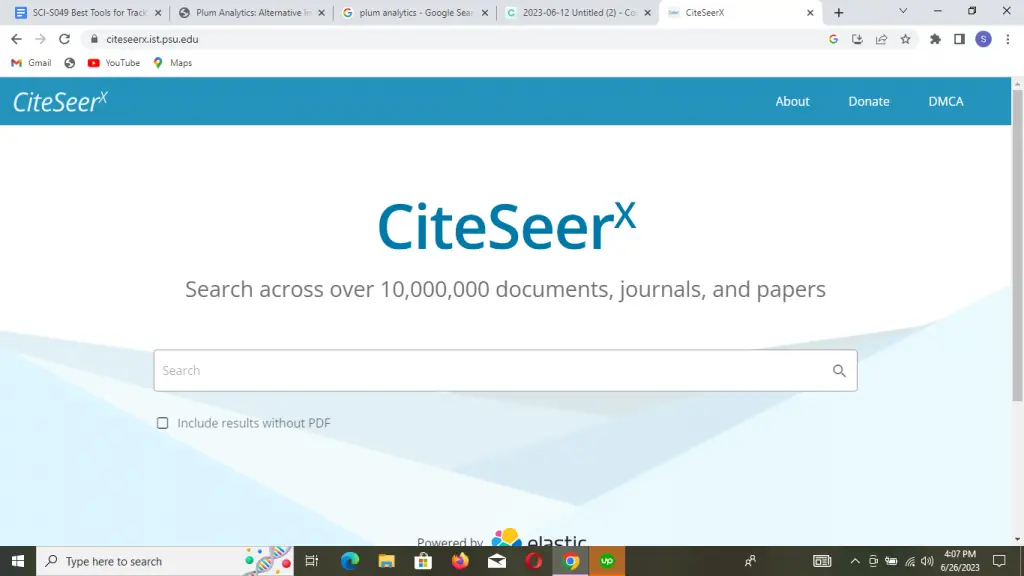
Summary
- Specializes in computer and information science literature
- Offers citation indexing and advanced search features
- Free to use
CiteSeerX is a free search engine and digital library that specializes in computer and information science literature. It offers citation indexing, advanced search features, and helps track research impact and citations for researchers in these fields.
What are the benefits of CiteSeerX?
- Focused Database: CiteSeerX is dedicated to computer and information science literature, providing a specialized resource for researchers in these fields.
- Citation Indexing: This tool indexes citations, allowing users to track the impact of their work.
- Full-Text Search: CiteSeerX offers full-text search capabilities for improved search results.
CiteSeerX is an essential tool for researchers in computer and information science, offering a specialized platform for searching and tracking citations in this field.
Source: https://citeseerx.ist.psu.edu/
#9. Semantic Scholar: Best for AI-powered search and discovery of scientific papers

Summary
- AI-powered search engine for scientific papers
- Offers personalized recommendations and citation tracking
- Free to use
Semantic Scholar is an AI-powered search engine that helps researchers discover and track scientific papers. It provides personalized recommendations, citation tracking features, and impact research tracking to enhance the research experience.
What are the benefits of Semantic Scholar?
- Enhanced AI Search: Semantic Scholar utilizes cutting-edge artificial intelligence techniques to refine search outcomes and identify pertinent academic papers.
- Interactive Visualizations: The platform offers dynamic visual representations of citation connections and evolving research patterns.
- Comprehensive Author Profiles: Semantic Scholar features in-depth author profiles encompassing publication records and essential citation statistics.
Semantic Scholar is an innovative tool for researchers looking for an AI-driven approach to search and discover scientific papers while tracking citations.
Source: https://www.semanticscholar.org/
#10. Lens.org: Best for exploring scholarly works, patents, and linking research with innovation
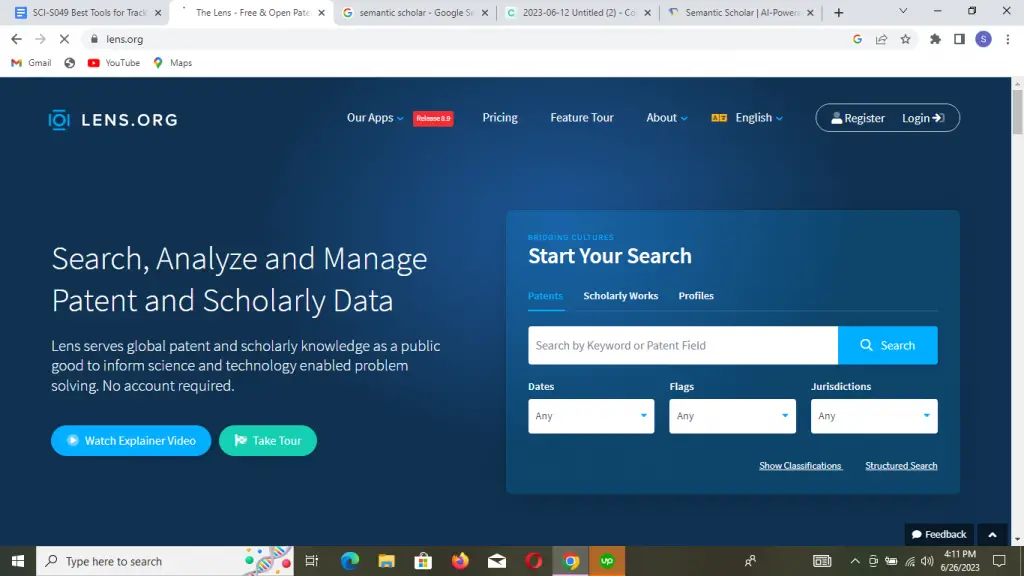
Summary
- Integrates scholarly works and patent data
- Offers analytics and visualization tools
- Free to use
Lens.org is a complimentary platform that combines academic publications and patent information, granting researchers a comprehensive perspective on research and innovation.
The platform incorporates analytical and visualization instruments to enable users to examine the relationships between research and patents while monitoring their research influence and citations.
What are the benefits of Lens.org?
- Extensive Scope: Lens.org encompasses academic papers, patents, and innovation data, delivering a complete understanding of research and its implications.
- Analytical Capabilities: The platform allows users to investigate research trajectories, patent overviews, and collaborative efforts.
- Unrestricted Access: Lens.org is openly available and provides open API access for developers, promoting the free exchange of information.
Lens.org is an invaluable resource for researchers looking to explore the connections between research and innovation, offering insights into the broader impact of their work.
Source: https://www.lens.org/
#11. CrossRef: Best for finding and linking research outputs through DOIs
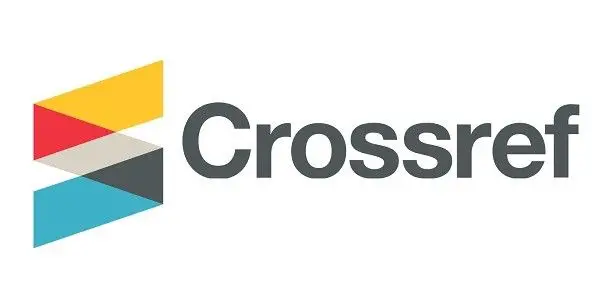
Summary
- Finds and links research outputs
- Uses Digital Object Identifiers (DOIs)
- Facilitates content discoverability
CrossRef is a resourceful platform designed to assist researchers in locating and connecting research outputs through the use of Digital Object Identifiers (DOIs).
By improving content discoverability and accessibility, it simplifies the process of monitoring research impact and citations, offering enduring links to research outcomes.
This essential instrument optimizes the procedure of identifying and connecting research outputs, making content effortlessly discoverable and available.
What are the benefits of CrossRef?
- DOI Registration: CrossRef enables the registration of DOIs for research outputs, ensuring persistent links and easy discoverability.
- Metadata Services: This tool provides metadata services for research outputs, facilitating citation tracking and linking.
- Interoperability: CrossRef supports the integration of DOIs in various platforms and tools, improving research discoverability and accessibility.
CrossRef is an invaluable tool for researchers looking to find and link research outputs, making content more discoverable and accessible. By providing persistent links to research outputs, it helps researchers track the impact and citations of their work more effectively.
Source: https://www.crossref.org/
#12. ResearchGate: Best for networking with researchers and discovering research publications

Summary
- Connects researchers worldwide
- Facilitates discovery of research publications
- Offers collaboration and networking opportunities
ResearchGate is a social networking platform that not only connects researchers worldwide and facilitates the discovery of research publications, but also excels in tracking research impact and citations.
This tool’s ability to monitor research impact and citations is invaluable for researchers who wish to stay informed about their research performance.
What are the benefits of ResearchGate?
- Building Professional Relationships: ResearchGate bridges the gap between researchers, offering a space for them to exchange insights and work together.
- Exploring Research Content: The platform allows users to find a wide range of research publications, including articles, preprints, and conference papers.
- Assessing Research Influence: ResearchGate presents citation metrics and other evaluation tools to gauge the significance of research contributions.
ResearchGate excels as a platform for researchers to network, discover publications, and encourage collaboration and knowledge sharing. It connects researchers and streamlines the discovery of publications, allowing for more effective tracking of work impact and citations.
Source: https://www.researchgate.net/
#13. Academia.edu: Best for sharing and discovering academic research papers
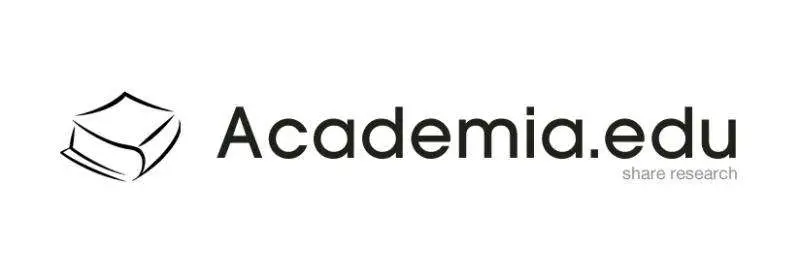
Summary
- Platform for sharing academic research
- Enhances discoverability of research papers
- Offers networking opportunities
Academia.edu serves as a platform for researchers to disseminate and explore scholarly research articles. The tool enhances research accessibility and offers networking opportunities.
This aids researchers in tracking their work’s impact and citations through increased visibility and connections with peers in their field.
What are the benefits of Academia.edu?
- Research Sharing: Academia.edu allows researchers to share their work and receive feedback from peers.
- Paper Discovery: Users can discover academic research papers in various disciplines.
- Networking: Academia.edu connects researchers, promoting collaboration and knowledge exchange.
Academia.edu is a useful platform for researchers to share, discover, and promote knowledge through academic papers and networking. It improves research discoverability and networking, enabling effective tracking of work impact and citations.
Source: https://www.academia.edu/
#14. Mendeley: Best for reference management, citation tracking, and collaboration
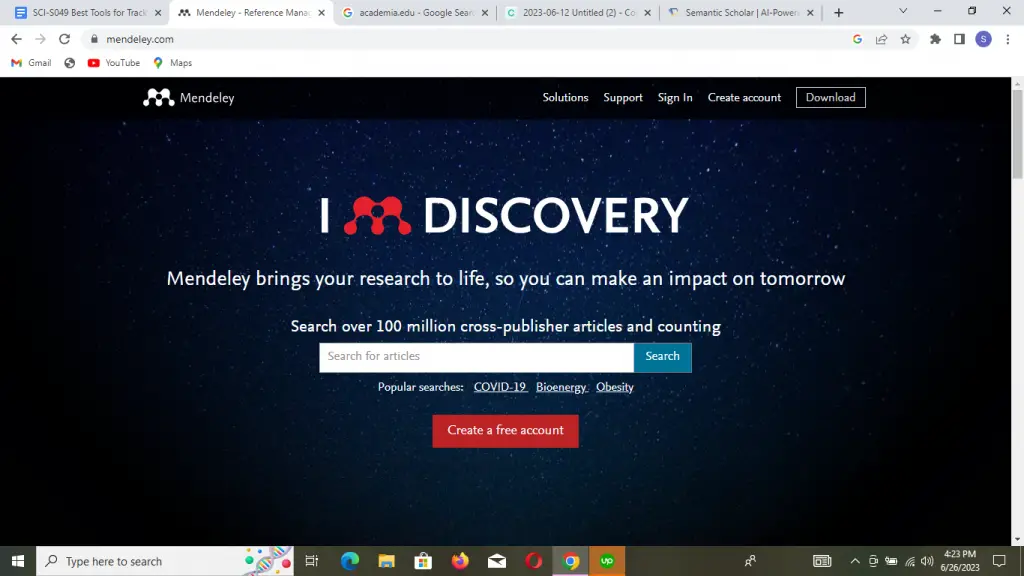
Summary
- Offers reference management features
- Tracks citations and research impact
- Facilitates collaboration among researchers
Mendeley is a versatile reference management tool designed to support researchers in various aspects of their work. Its core features include organizing, storing, and retrieving references, tracking citations, and assessing research impact.
Mendeley also promotes collaboration among researchers, enabling them to work together more effectively.
What are the benefits of Mendeley?
- Reference Management: Mendeley helps users manage and organize their references and generate citations.
- Collaboration Tools: This tool offers features for collaborating with colleagues, including shared libraries and notes.
- Research Discovery: Mendeley provides personalized recommendations based on users’ research interests.
Mendeley is an essential tool for researchers seeking efficient reference management, citation tracking, and collaboration features.
Source: https://www.mendeley.com/
#15. Zotero: Best for collecting, organizing, and sharing research sources
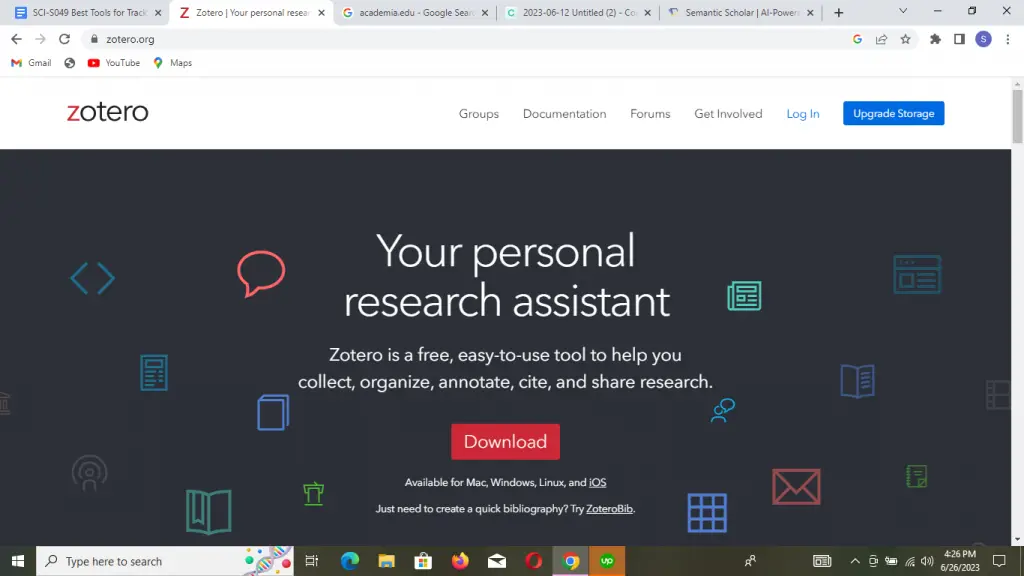
Summary
- Collects and organizes research sources
- Supports citation management
- Facilitates sharing of research materials
Zotero is an excellent tool designed for researchers to collect, organize, and share research sources. One of the key features of Zotero is its ability to track the impact and citations of a researcher’s work, providing valuable insights into the reach and influence of their research.
What are the benefits of Zotero?
- Reference Management: Zotero allows users to collect, organize, and generate citations for their research sources.
- Collaboration: As a user, you can collaborate with colleagues by sharing libraries and notes.
- Browser Integration: Zotero offers browser extensions for easy collection of research sources while browsing the web.
Zotero is an excellent tool for researchers looking to collect, organize, and share research sources, streamlining the research process.
Source: https://www.zotero.org/
#16. WorldCat: Best for locating books, articles, and other materials in libraries worldwide
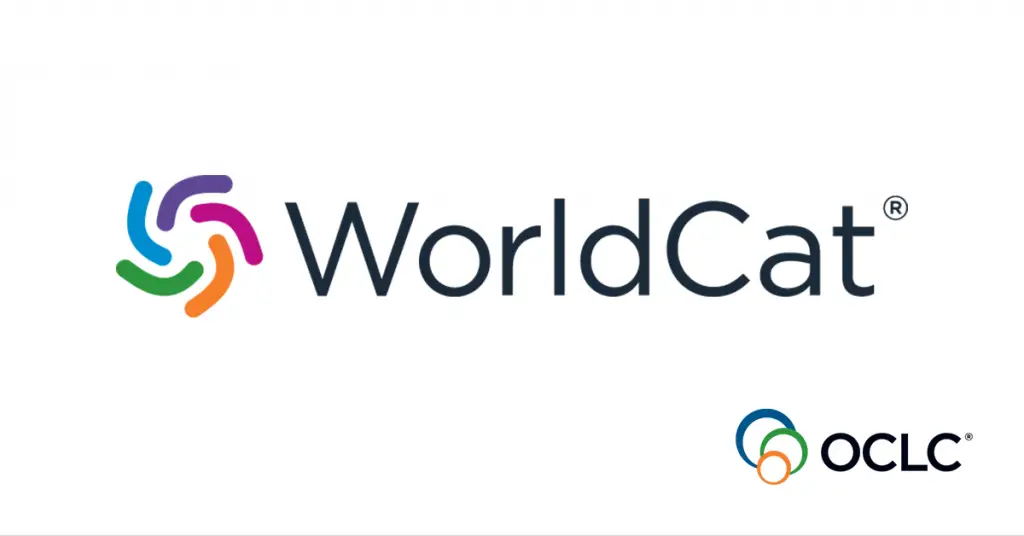
Summary
- Locates books, articles, and materials
- Searches libraries worldwide
- Facilitates interlibrary loan requests
WorldCat serves as a comprehensive global catalog, enabling researchers to find books, articles, and other materials from libraries across the globe. Its ability to facilitate interlibrary loan requests and resource sharing greatly enhances the accessibility of research materials.
Additionally, WorldCat supports researchers in tracking the impact and citations of their work, making it an invaluable tool for understanding and evaluating the reach and influence of research outputs.
What are the benefits of World at?
- Global Library Catalog: This tool connects users to the collections of thousands of libraries worldwide, making it easy to locate materials.
- Interlibrary Loan: Users can also request materials from other libraries through interlibrary loan services.
- Citation Tools: WorldCat provides citation tools for various citation styles.
WorldCat stands out as an indispensable resource for researchers who need to locate books, articles, and other materials from libraries worldwide.
Its emphasis on resource sharing and accessibility makes it a valuable asset for researchers to effectively track the impact and citations of their work.
Source: https://www.worldcat.org/
#17. SSRN: Best for accessing early-stage research in social sciences and humanities
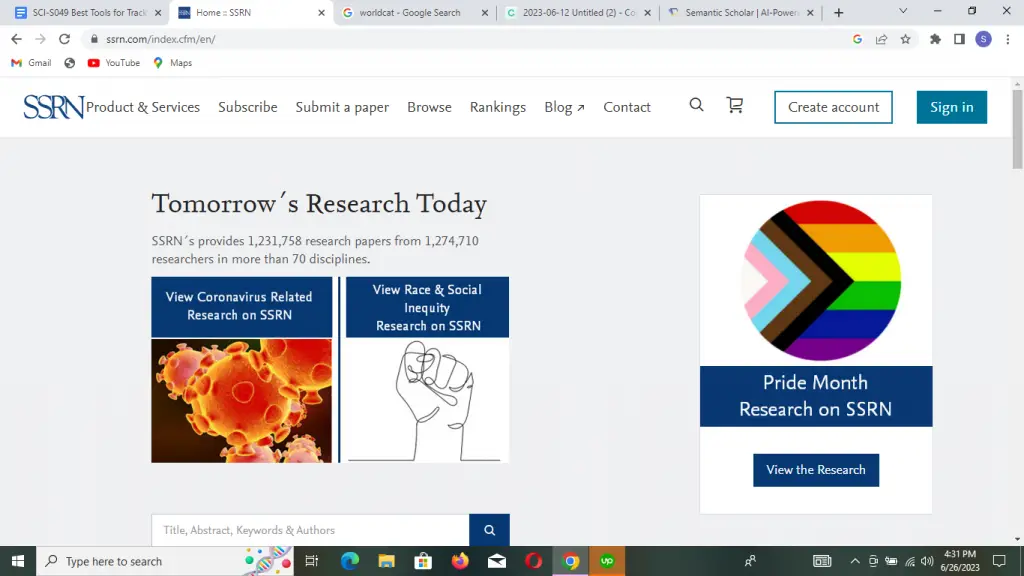
Summary
- Accesses early-stage research
- Focuses on social sciences and humanities
- Offers working papers and preprints
SSRN is a platform dedicated to offering access to preliminary research in social sciences and humanities. It provides working papers and preprints, allowing researchers to share knowledge while tracking the impact and citations of their work, making it a valuable resource for these fields.
What are the benefits of SSRN?
- Preprint Access: SSRN provides access to early-stage research in social sciences and humanities, including working papers and conference papers.
- Research Sharing: The platform allows users to share their studies and receive valuable feedback from fellow academics.
- Networking: SSRN connects researchers, promoting collaboration and knowledge exchange.
SSRN’s focus on early-stage research enables researchers to effectively track the impact and citations of their work.
Source: https://www.ssrn.com/index.cfm/en/
#18. arXiv: Best for accessing preprints in physics, mathematics, computer science, and related fields
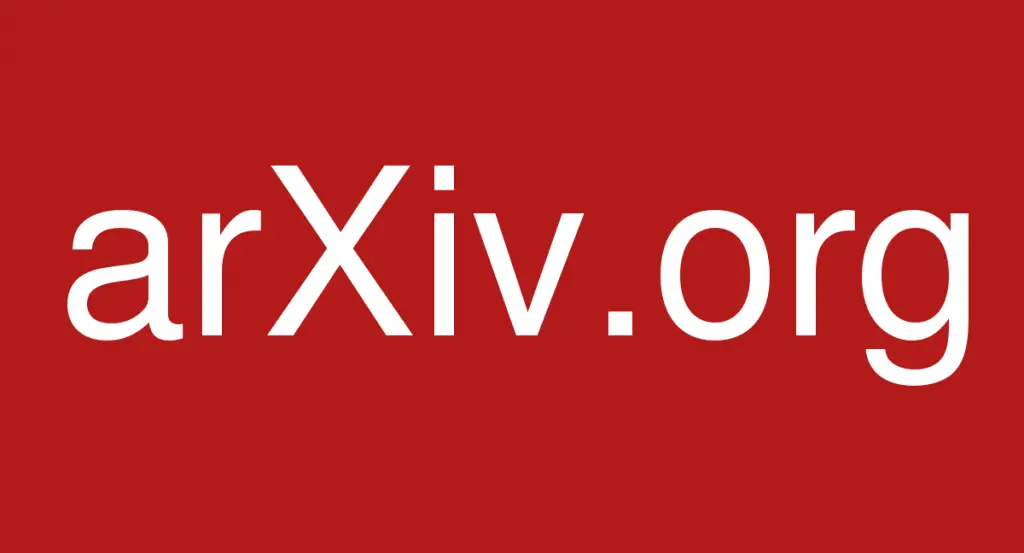
Summary
- Accesses preprints in various fields
- Focuses on physics, mathematics, and computer science
- Offers open access to research
arXiv is a platform for accessing preprints in areas like physics, mathematics, computer science, and related fields. This resource promotes knowledge sharing and collaboration by offering open access to research materials, enabling researchers to track their work’s impact and citations through preprints.
What are the benefits of arXiv?
- Preprint Repository: arXiv offers access to preprints in various scientific disciplines, allowing users to access the latest research.
- Research Sharing: Researchers can share their work through arXiv, receiving feedback and improving their research.
- Open Access: arXiv is freely accessible, ensuring that research is available to a wide audience.
With arXiv, researchers can effectively track the impact and citations of their work through the platform’s emphasis on preprints.
Source: https://arxiv.org/
#19. RePEc: Best for accessing research papers in economics
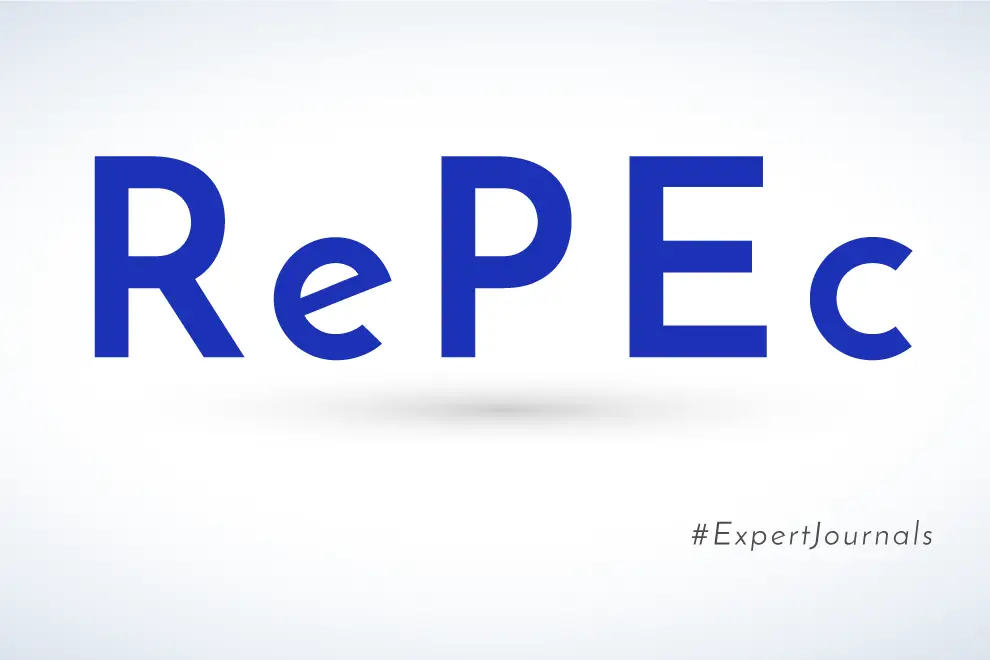
Summary
- Accesses research papers in economics
- Offers most frequently used journals, and software components
- Promotes open access to research
RePEc, short for Research Papers in Economics, serves as a comprehensive platform that grants access to various resources in the economics field, including working papers, journal articles, and software components.
By promoting open access to research, RePEc caters to the needs of researchers, academics, and policymakers. Additionally, it tracks research impacts and citations, further establishing its importance in the economics domain.
What are the benefits of RePEc?
- Economics Database: This tool focuses on research papers in economics, providing a specialized resource for researchers in this field.
- Citation Analysis: RePEc allows for tracking citations and analyzing research impact using various metrics.
- Author Profiles: With RePEc, author profiles are available, showcasing publication history, citation metrics, and affiliations. This feature ensures that users can easily find relevant information about authors and their work.
RePEc is an essential resource for researchers in economics, providing access to research papers and promoting knowledge sharing. By providing access to a wide range of economic research papers, it helps researchers track the impact and citations of their work more effectively.
Source: http://repec.org/
#20. Papers with Code: Best for discovering research papers with associated code implementations

Summary
- Discovers research papers with code
- Links papers to code repositories
- Facilitates reproducibility and collaboration
Papers with Code is a platform that helps researchers discover research papers with associated code implementations. It links papers to code repositories, facilitating reproducibility and collaboration.
This makes it easier for researchers to track the impact and citations of their work by providing access to research papers with associated code implementations.
Benefits
- Code Integration: Papers with Code links research papers to their associated code implementations, making it easy for users to access and reproduce research.
- AI-Driven Search: This tool uses artificial intelligence to improve search results and discover relevant papers.
- Research community Contributions: Users can contribute code implementations and improve existing resources.
Papers with Code is an invaluable resource for researchers looking to discover research papers with associated code implementations, promoting reproducibility and collaboration.
Source: https://paperswithcode.com/
#21. JSTOR: Best for accessing academic journals, books, and primary sources in various disciplines

Summary
- Accesses academic journals, books, and primary sources
- Covers various disciplines
- Offers a digital library of resources
JSTOR is an online library offering access to academic journals, books, and primary sources across multiple fields. With its extensive collection, researchers can easily monitor the impact and citations of their work by accessing a vast array of academic resources.
What are the benefits of JSTOR?
- High-Quality Content: JSTOR offers a vast selection of top-notch, peer-reviewed literature, books, and primary sources for researchers.
- Advanced Search Options: With JSTOR, users can utilize filters and advanced search features to narrow down their search results effectively.
- Personalized Recommendations: JSTOR delivers customized suggestions tailored to users’ research interests, enhancing their overall experience.
JSTOR is an essential resource for researchers looking to access academic journals, books, and primary sources in various disciplines, offering a comprehensive collection of resources.
Source: https://www.jstor.org/
#22. Europe PMC: Best for searching life sciences articles and preprints with a European focus
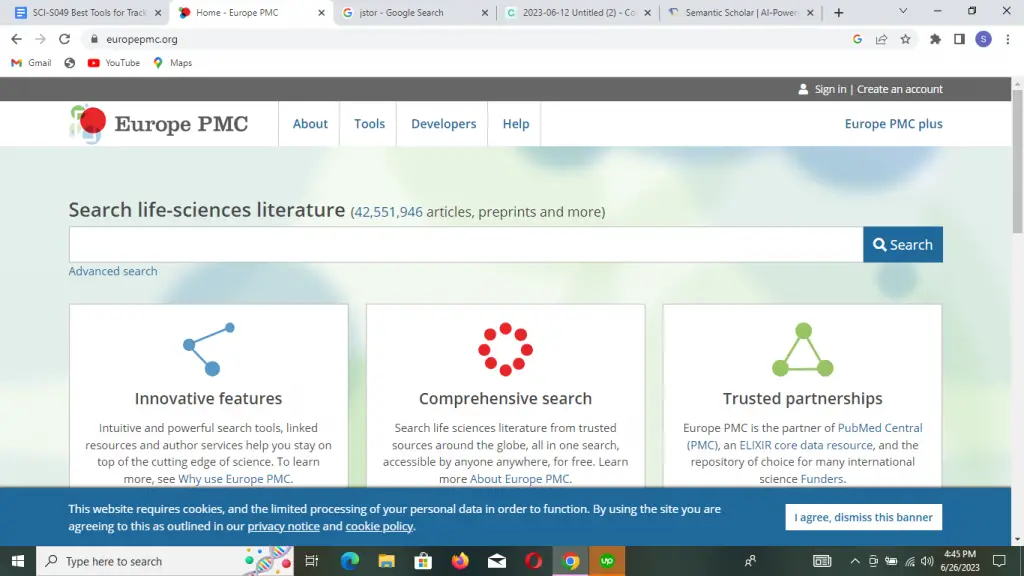
Summary
- Searches life sciences articles and preprints
- Focuses on European research
- Offers citation tracking and advanced search features
Europe PMC is a valuable resource for researchers in the life sciences field, focusing on European research. This platform simplifies the search for articles and preprints, while offering advanced features such as citation tracking.
By providing easy access to a vast array of resources, Europe PMC allows researchers to concentrate on their work’s impact and citation metrics..
What are the benefits of Europe PMC?
- Specialized Database: As a researcher in life sciences, you’ll appreciate that Europe PMC focuses on European literature in your field, making it a valuable resource for your work.
- Advanced Search Options: You can easily refine your search results by applying filters and taking advantage of advanced search options.
- Open Access: With free access to Europe PMC, you can search and access full-text articles without worrying about subscriptions.
Europe PMC is a comprehensive European-focused platform for life sciences researchers to search articles, preprints, and track their work’s impact and citations.
Source: https://europepmc.org/
#23. OpenAIRE: Best for accessing open access research outputs from European funded projects

Summary
- Accesses open access research outputs
- Focuses on European funded projects
- Offers a comprehensive database of resources
OpenAIRE is a platform designed to offer access to open access research outputs originating from European funded projects.
With its extensive database of resources, OpenAIRE simplifies the process for researchers to track the impact and citations of their work by granting access to a wide variety of open access research outputs.
As a result, researchers can concentrate more on the overall impact and citations of their research.
What are the benefits of OpenAIRE?
- European Focus: OpenAIRE provides access to open access research outputs from European funded projects, including publications, datasets, and software.
- Project Information: As a user, you can access information about research projects, including funding and collaboration details.
- Open Access: OpenAIRE is freely accessible, ensuring that research is available to a wide audience.
OpenAIRE is an essential resource for researchers looking to access open access research outputs from European funded projects, offering a comprehensive database of resources.
Source: https://www.openaire.eu/
#24. Scholarometer: Best for measuring the impact of authors and publications using various metrics

Summary
- Measures the impact of authors and publications
- Uses various metrics
- Offers a browser extension
Scholarometer is an innovative tool designed to help researchers assess the impact of authors and publications through the use of various metrics.
With the added convenience of a browser extension, Scholarometer enables easy access and analysis for researchers who want to track the influence and citation rates of their work.
What are the benefits of Scholarometer?
- Impact Metrics: Scholarometer provides various metrics for measuring the impact of authors and publications, including h-index and g-index.
- Discipline Comparisons: You can compare the impact of authors and publications across different disciplines.
- Browser Integration: Scholarometer offers browser extensions for easy access to impact metrics while browsing the web.
Scholarometer is a useful instrument for researchers aiming to evaluate the impact of authors and publications through diverse metrics. This tool assists researchers in efficiently monitoring the influence and citations of their work by using multiple metrics.
https://scholarometer.indiana.edu/
#25. Sciwheel: Best for reference management, collaboration, and manuscript preparation

Summary
- Offers reference management features
- Facilitates collaboration among researchers
- Supports manuscript preparation
Sciwheel is an all-in-one reference management software program designed to assist researchers in collaboration and manuscript preparation. This centralized platform for managing references and collaborating with peers enables researchers to concentrate on improving the impact and citations of their research.
Benefits
- Reference Management: Sciwheel helps users manage and organize their references and generate citations.
- Collaboration Tools: This tool offers features for collaborating with colleagues, including shared libraries and notes.
- Manuscript Preparation: Sciwheel provides tools for manuscript preparation, including citation formatting and collaborative editing.
Sciwheel is an essential tool for researchers seeking efficient reference management, collaboration, and manuscript preparation features.
Conclusion
Tracking research impact and citations is crucial in today’s research landscape. Tools like Google Scholar, Scopus, Web of Science, ResearchGate, and Altmetric offer unique features to cater to different needs.
Utilizing these tools, researchers can optimize their strategies, foster collaboration, and make data-driven decisions. Explore these platforms to find the best fit for your research goals and enhance your research.

